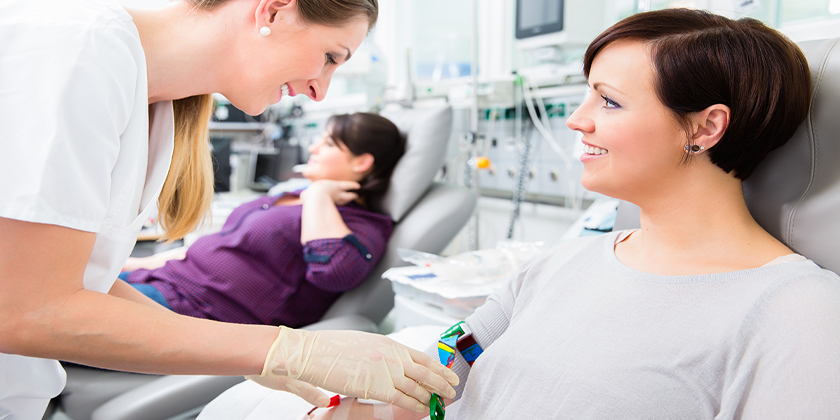5 Signs You Have A Hormonal Imbalance

Throughout the course of your life, it’s perfectly normal for your hormone levels to shift. How do you think puberty or menopause happens? Not to mention pregnancy! But there are also some key times in life when your hormones may be out of whack when they should be steady and balanced. How do you know the difference? This week we’re discussing 5 common symptoms of hormonal imbalance, and what you can do to help bring your body back to neutral.
Hair Loss
It is normal to lose a little bit of hair every day. It comes out when we brush our hair, wash our hair, if it’s a windy day, etc. But if you notice your hair growing increasingly thinner, larger portions coming out in the brush or around the drain, your main issue may be your hormones.
There are many hormonal issues that lead to hair loss, but the most common is an issue with your thyroid. If your thyroid is low-functioning, your hair will begin to thin out. You may also have drying skin, constipation, and other factors that contribute to a low-thyroid hormone. If this is the case, make an appointment with your doctor to have some routine blood work done to test your thyroid level. It could mean the difference between long and stringy or full and luxurious locks!
Hot Flashes
Getting hot flashes and night sweats before your mid-30’s? A lack of estrogen is almost certainly to blame. And while night sweats and hot flashes are very common for those going through perimenopause or menopause (and also women who have gone through chemotherapy or ovarian surgery), if you fall within the “too young for that” range (anytime before 35), it could mean your hormones are off.
Digestive problems
Did you know that women are more prone to IBS (Irritable Bowel Syndrome) than men? Estrogens affect the microflora in your gut, as well as help your GI tract function. If your hormones aren’t where they should be, you may be feeling a lot of bowel discomfort, bloating, constipation or diarrhea, nausea in your premenstrual phase, and general abdominal discomfort.
Insomnia
There are many ways you might be having difficulty sleeping. But, if after you’ve cut out caffeine, and tried putting yourself on a reasonable sleep schedule and still see nothing but a ceiling fan and dark circles under your eyes, you may have a Melatonin deficiency.
Melatonin is released by the pineal gland in the brain. It is related to and greatly affected by the other hormones in your body. So while you may be able to temporarily fix the problem with a Melatonin supplement, it’s best to speak with your doctor to make sure it isn’t an imbalance in one of the other connected hormones.
Low Sex Drive and PMS
Both men and women have a regulated set of estrogen, progesterone, DHEA, and testosterone. When the balance is off, it can affect the sex drive of both and can increase symptoms of PMS and cause irregular periods in women. When your periods are out of sorts (too long, too short, too heavy, etc.), it’s easier to see that your hormones need a little work. With a decrease in libido, it might not be so obvious. If you previously have had a relatively “normal” and satisfying sex life and are finding yourself not “in the mood” as often as before, speak with your doctor to have your sex hormones checked.
How to Get Your Hormones Where They Need To Be
Treatment for hormonal imbalances will vary depending on what’s causing them. Every woman will require a different treatment, but they could be any of the following:
- Vaginal Estrogen – A cream or topical containing estrogen that is directly applied to the vaginal tissue.
- Hormonal Birth Control – If you are not trying to get pregnant, birth control medications that contain varying levels of estrogen and progesterone can help regulate irregular periods and ease the symptoms of PMS.
- Hormone Replacement Medications – With a choice of bioidentical or synthetic hormones, these are doctor prescribed medications that will add the missing hormones you may have.
- Anti-androgen medications – Medications that block the predominately male-sex hormone androgen can help limit severe acne and excessive hair growth or loss.
If you think you may have a hormonal imbalance, give Miami Center of Excellence a call. We can set up the correct testing and course of treatment to get you feeling like yourself again.
